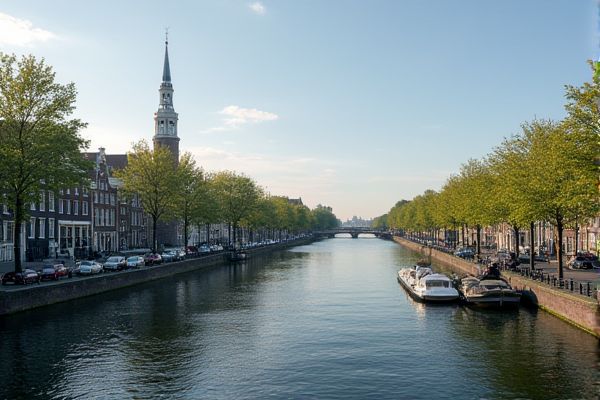
Local laws and regulations in Netherlands: Mandatory health insurance requirement. Register at local municipality (BRP). Residence permit essentials for non-EU citizens. Dutch employment rights and contracts. Bicycle traffic rules and regulations. Housing rental agreements and tenant rights. Public holidays and working hours regulations. Taxation system: income tax and VAT. Child and family benefits. Legal drinking and smoking age.
Mandatory health insurance requirement.
In the Netherlands, anyone living or working there must take out Dutch health insurance within four months of arrival, regardless of any existing health insurance from another country. The coverage starts from the day of arrival, and it is mandatory to register with a Dutch municipality. For more details, you can visit the Health Insurance section on the Government of Netherlands website.
Register at local municipality (BRP).
To register at a local municipality in the Netherlands, you must do so within five days of arrival if you plan to stay longer than four months. This process requires providing necessary documents such as proof of identity and address, and obtaining a citizen service number (BSN) upon registration. For detailed guidance on this process, you can visit the Dutch government's website on registering with the Personal Records Database. This ensures compliance with local regulations and facilitates your administrative processes during your stay in the Netherlands.
Residence permit essentials for non-EU citizens.
Non-EU citizens planning to stay in the Netherlands for more than 90 days are required to obtain a residence permit, which necessitates a valid reason such as work, study, or joining a partner. In many cases, an authorisation for temporary stay (MVV) is also required to enter the country. These individuals must meet certain conditions, including having a valid passport, sufficient financial means, and health insurance, while ensuring they do not pose a risk to public order. For further detailed information, please consult the official [Immigration to the Netherlands](https://www.government.nl/topics/immigration-to-the-netherlands/question-and-answer/do-i-need-a-residence-permit-if-i-want-to-stay-in-the-netherlands-for-a-long-period-of-time) website.
Dutch employment rights and contracts.
Dutch Employment Law mandates detailed employment contracts, ensuring equal treatment and pay, specifying job details, working hours, salary, and benefits. Employees have rights to request changes in working hours, workplace, or contract type, and are protected against unfair termination and discrimination. There are strong provisions for health and safety, holiday entitlements, and minimum wage compliance detailed on the Business.gov.nl website.
Bicycle traffic rules and regulations.
In the Netherlands, cyclists are required to adhere to specific Traffic Rules and Regulations to ensure safety and harmony on the roads. Cyclists must use cycle paths or bike lanes when available, maintain their position on the right side of the road, and obey traffic lights. It is also essential for cyclists to use hand signals when turning and refrain from cycling on pavements. Bicycles need to be equipped with a working bell and lights for nighttime riding. Additionally, cyclists are permitted to ride two abreast but must yield to other traffic when necessary.
Housing rental agreements and tenant rights.
In the Netherlands, Tenant Rights are protected by strict regulations, including the right to a written rental agreement, protection from excessive rent increases, and the prohibition of landlords entering the property without consent. From July 1, 2024, only indefinite rental contracts are allowed, providing tenants with long-term security, and rent is controlled through a points system to ensure fair pricing. For more detailed information, visit Housing Anywhere.
Public holidays and working hours regulations.
In the Netherlands, public holidays are not mandatory for employers unless specified in employment contracts or collective labor agreements, with seven official public holidays totaling 11 days. Working hours are regulated with a maximum of 12 hours per shift and 60 hours per week for brief periods. However, there are stricter limits over longer periods, such as 55 hours per week over four weeks and 48 hours per week over 16 weeks. To understand more about the [working hours](https://www.iamexpat.nl/career/working-in-the-netherlands/working-hours) regulations and their implications, it is essential to refer to the guidelines provided on career-focused platforms like IamExpat.
Taxation system: income tax and VAT.
In the Netherlands, the taxation system divides income into three boxes: Box 1 for income from work and home ownership, taxed progressively; Box 2 for substantial interests in companies, taxed at 24.5% or 31%; and Box 3 for savings and investments, taxed at a flat rate of 36%. There are no local taxes on income, and VAT (BTW) is levied at rates of 0%, 9%, and 21% on goods and services. For more comprehensive details, you can visit the Tax Summaries by PwC website, which provides an in-depth look at the country's tax structure.
Child and family benefits.
In the Netherlands, families can receive several child and family benefits, including the child benefit (*kinderbijslag*), which is a quarterly payment to help cover the costs of raising children, the child budget (*kindgebonden budget*), an income-dependent supplement, and the childcare benefit (*kinderopvangtoeslag*), which helps with childcare costs for working parents. Eligibility and amounts vary based on factors such as residence, income, and the number and age of the children. For more detailed information on these benefits, visit the IamExpat website.
Legal drinking and smoking age.
In the Netherlands, the legal drinking age for all alcoholic beverages is 18 years, and sellers are required to verify the age of the buyer. For smoking, individuals must also be 18 years old to enter coffeeshops and purchase cannabis, accompanied by strict regulations against public consumption in certain areas. For more detailed information, you can visit the Dutch Alcohol Policy webpage, which outlines specific legal stipulations and guidelines designed to maintain public order and health within society.
